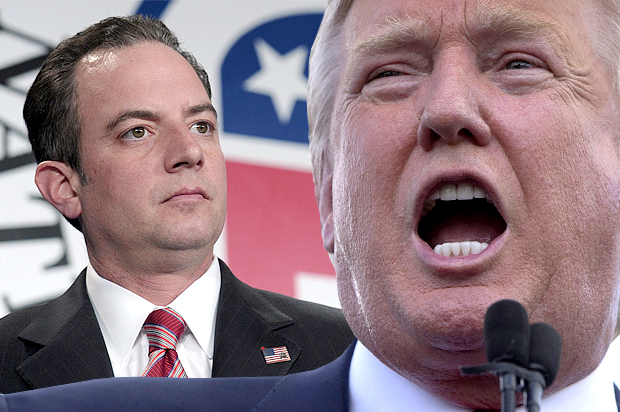Donald Trump often boasted on the campaign trail that he only hires “the best people,” even as his campaign managers were investigated for physically assaulting a reporter and criticized for having improper ties to the Ukrainian government. Now the president-elect is facing a groundswell of pushback from “the best people” he has hired, as his campaign team turns into a serious transition operation with an eye toward the White House. Two weeks after his surprise election, Trump is already being publicly undercut by everyone from his former campaign manager to his incoming chief of staff.
On Tuesday Trump sat down for an hourlong interview with The New York Times. The on-the-record postelection meeting almost never happened, however. In the predawn hours when America’s president-elect prefers to send out Twitter missives, Trump backed out of the previously scheduled meeting, citing the Times’ decision to change the conditions:
I cancelled today's meeting with the failing @nytimes when the terms and conditions of the meeting were changed at the last moment. Not nice
— Donald J. Trump (@realDonaldTrump) November 22, 2016
Trump eventually relented and agreed to the meeting after the Times made clear that it was actually Trump who tried to change the rules of the meeting, by insisting on the cancellation of an on-the-record segment, which both sides had previously agreed to. The Times reported it was Trump’s transition team that had led him to believe otherwise, for fear he would only embarrass himself in front of the newspaper’s reporters.
“Three people with knowledge of Mr. Trump’s initial decision to cancel the meeting said that Reince Priebus, the incoming White House chief of staff, had been among those urging the president-elect to cancel it,” the Times reported on Tuesday. According to the newspaper, the Republican National Committee chairman feared Trump “would face questions he might not be prepared to answer”:
It was Mr. Priebus who relayed to Mr. Trump, erroneously, that The Times had changed the conditions of the meeting, believing it would result in a cancellation, these people said.
The news of Priebus’ attempted manipulation of Trump came on the same day that Trump’s former campaign manager, Kellyanne Conway, pronounced that Trump had suddenly reversed course on a major campaign pledge and would no longer seek criminal charges against former rival Hillary Clinton (a power not even granted the president).
“I think when the President-elect, who’s also the head of your party, tells you before he’s even inaugurated that he doesn’t wish to pursue these charges, it sends a very strong message, tone, and content. And I think Hillary Clinton still has to face the fact that a majority of Americans don’t find her to be honest or trustworthy, but if Donald Trump can help her heal, then perhaps that’s a good thing,” Conway said on MSNBC’s “Morning Joe.”
In his meeting with the Times on Tuesday afternoon, Trump reluctantly echoed Conway’s comments.
“I think it would be very very divisive for the country,” Trump said. “I don’t want to hurt the Clintons; I really don’t. She went through a lot and suffered greatly in many different ways.”
But Trump has been being played like a fiddle by the very “best people” he hires for a while now.
As The Washington Post recently laid out, former Breitbart chief turned top Trump adviser Steve Bannon has long been at work coaxing Trump into his radical right-wing positions in order to mold him into the perfect politician for the alt-right. Even before joining Trump’s campaign, Bannon often appeared to use flattery to help convince Trump of his far-right positions during appearances on Breitbart’s radio program:
When Trump came on the air, the first thing Bannon wanted to talk about was how well Trump was doing in his campaign—and how Bannon had noticed it before other people did.
“I said, ‘This guy, people are leaning forward in these audiences when he’s talking,’ ” Bannon said, recalling earlier conversations about Trump’s run. “And we were mocked and ridiculed.”
Before appearing before Fox News’ Sean Hannity, Bannon apparently served as Trump’s top media sycophant, interviewing the businessman for Breitbart, according to The Washington Post:
In most of the interviews, Bannon often called his subject “sir” or “Mr. Trump.” Trump called his interviewer “Steve.”
In his questions, Bannon often began with praise for Trump. Asking about foreign affairs, for instance, Bannon praised Trump’s capacity for dealmaking.
“It’s complicated,” Bannon said. “That’s your calling card.”
“I love complicated,” Trump responded. “I thrive on complicated.”
Only two weeks since his historic election, it’s becoming painfully clear to Trump’s outraged base that he is merely a puppet being played by the professionals around him. After Trump breaks all his campaign promises, perhaps his supporters can rest easy knowing that he might not have been lying when he boasted about hiring all of “the best people.” They just don’t appear to think the same about him.


